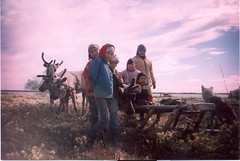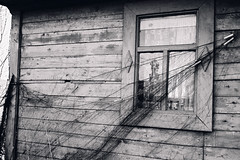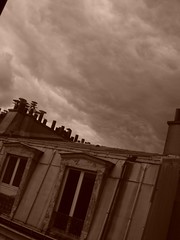Piers Vitebsky, The Reindeer People: Living with Animals and Spirits in Siberia. Houghton Mifflin, [2005] 2006.
When I told my aunt that I wanted to go to Siberia to find the village where my grandmother (her mother) was exiled for seventeen years, her immediate reaction was: “you can’t do that! you can’t go there!”
Since then, she’s changed her mind, and though I don’t think she would ever considering striking out into the tundra to find Brovka herself, she is now one hundred per cent behind the idea of my making the journey.
But her initial reaction got me thinking about how we imagine Siberia.
For my family, Siberia is not a place, but a catastrophe. It’s a trauma of the past: a scar that marks every member of our family more or less visibly. And in this sense, my aunt is right: you can’t go back there.
So, when I decided that my next big project would be about Siberia, I wanted to start thinking about it as a real place, and to try and see it through different eyes.
Even though the tundra, the permafrost, and the mines of the region have served as a place of banishment, punishment, death, and exile for hundreds of years, the place has another significance.
For its indigenous people — the Eveny, Chukchi, Sakha, and many others — Siberia is home.
Piers Vitebsky is an anthropologist at Cambridge University, and his book, The Reindeer People, tells of his many journeys to Siberia, where he lived with Eveny reindeer herders. Together with them, he travelled, ate, slept, and made offerings of vodka to the gods.
After reading this book, I became fascinated not only by the herding life, but by anthropologists. From his book, Vitebsky appeared to be adventurous and gregarious: so different from the vast majority of literary scholars, philosophers, or philologists I’ve encountered, who tend to be tortured, introverted, and socially awkward (myself included). And on top of it all, Vitebsky was a good story-teller.
Who knew anthropologists were so cool?
He starts by giving quick historical overview of the Eveny people, followed by a warm account of their present lives.
Then, just when you’re wishing you too could live a nomadic life, he hits you with reality: alcoholism and suicide, environmental disasters, gender inequities, economic hardship, racism, the ambiguous relationship of the herder communities to the gulag system, and the death of their native languages.
Perhaps the bravest moment of the book, from a writer’s standpoint, is when Vitebsky brings his wife and two children to spend a summer with him among the herders. The conflicts that arise are funny and instructive: they force the anthropologist to see things he’d never noticed before. Not every family would survive this kind of test, but to their great credit, the Vitebskys return home to England intact.
Scholarly and informed, Vitebsky’s book is absolutely accessible to a non-academic audience. It’s a good text to pick up if, like me, you want to see Siberia through a new lens.
[Photo by ugraland]




